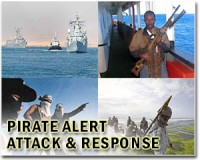| . |  |
. |
Mogadishu, Somalia (UPI) May 10, 2010 As Somali pirates extend their operation deeper into the Indian Ocean, Western private security firms are seeking to re-establish the centuries-old system of "letters of marque and reprisal" that allows privateers to pursue maritime marauders. The system was introduced by King Edward III of England in the Middle Ages but it is also on U.S. statute books as Article One, paragraph 8, clauses 10 and 11, of the U.S. Constitution, and in Title 33 of the U.S. Code, paragraphs 385 and 386. Maj. Theodore Richard, a lawyer in the Commercial Litigation Division of the U.S. Air Force, published a lengthy article in favor of reviving letters of marque in the Public Contract Law Journal in April. On April 15, 2009, U.S. Rep. Ron Paul, R-Texas, advocated the use of letters of marque and reprisal against the Somali pirates. The bills he introduced weren't passed. Paul was instrumental in introducing the Marque and Reprisal Act of 2001 in Congress following the Sept. 11, 2001, attacks. He maintained the hijacking of U.S. airliners constituted air piracy and he wanted to grant the president the authority to issue letters of marque and reprisal against specific terrorists. He raised the issue again on July 21, 2007, but Congress has made no move toward invoking the constitution to combat piracy. Still, Intelligence Online, a Paris Web site that covers global security issues, reports that "several private security firms" are pressing for the U.S. government and other Western authorities to re-establish letters of marque. These would sanction private companies to actively hunt down pirates rather than just provide security teams aboard commercial vessels. That would be in line with the wide-scale outsourcing of security missions to private security companies who are active in Iraq, Afghanistan and Pakistan in support of U.S. and allied forces. Allowing armed privateers to combat piracy in the Gulf of Aden would supplement U.S. and European naval task forces off Somalia. But it could be applied to other key maritime zones such as the Atlantic off oil-rich West Africa, the Red Sea, the Strait of Malacca and the South China Sea where pirates are active. As Somali pirates conduct operations further afield from the Gulf of Aden, in part because of international naval intervention, there is a growing need for more warships to protect shipping lanes across the Indian Ocean, a key energy artery between the Gulf and Asia. Among the firms showing interest in the issue is Espada Logistics & Security Group of San Antonio, Intelligence Online reports. Espada has a fleet of five patrol vessels deployed in the Gulf of Aden working for shipping companies but Intelligence Online says "it is looking into offering its services to governments as a pirate hunter." Espada has hired former employees of Xe Services, formerly known as Blackwater. In 2008, Blackwater, which was heavily engaged in Iraq following the 2003 invasion, purchased a research vessel, the MacArthur, and turned it into a private warship to fight pirates in the Gulf of Aden. Only two private security companies are known to have actually secured government contracts to pursue the Somalia pirates. One is a British outfit called Hart, which was hired by Puntland, an independent enclave in northeastern Somalia, in exchange for payment in fishing licenses. The other is Nordic Crisis Management of Norway which has been working for Somaliland, another independent enclave, since 2006, with funding from Norway. Intelligence Online reports that other private security firms, including Topcat Marine Security and Northbridge Services Group of the United States, Odyssey Consulting of Switzerland and Secopex of France signed anti-piracy deals with Somalia's Transitional Federal Government, but "their performance did not amount to much." The first recorded use of letters of marque and reprisal was an English statute in 1354 during the reign of Edward III. This led to the exploits of English raiders such as Sir Francis Drake, who famously ravaged Spanish shipping in the name of Queen Elizabeth I in the 16th century. During the American Revolution, state legislatures and later the Continental Congress authorized letters of marque. These were also issued to combat the Barbary pirates in the early 19th century but none has been legitimately issued by the United States since then.
Share This Article With Planet Earth
Related Links 21st Century Pirates
 France admits military killed hostage in pirate shootout
France admits military killed hostage in pirate shootoutParis (AFP) May 5, 2010 The French government Wednesday admitted responsibility for the death of a yachtsman shot by French commandos during a raid to free him and his wife from pirates off Somalia last year. The state "will take full responsibility" for the death of Florent Lemacon in the shoot-out on his yacht in the Indian Ocean on April 10, 2009, Defence Minister Herve Morin said in a statement. The stateme ... read more |
|
| The content herein, unless otherwise known to be public domain, are Copyright 1995-2010 - SpaceDaily. AFP and UPI Wire Stories are copyright Agence France-Presse and United Press International. ESA Portal Reports are copyright European Space Agency. All NASA sourced material is public domain. Additional copyrights may apply in whole or part to other bona fide parties. Advertising does not imply endorsement,agreement or approval of any opinions, statements or information provided by SpaceDaily on any Web page published or hosted by SpaceDaily. Privacy Statement |